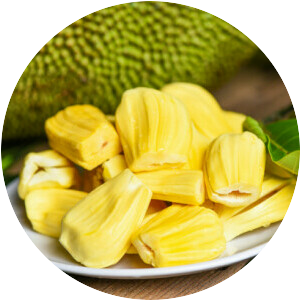 The jackfruit is one of the most fascinating fruits, surprising the world with its sheer size! In fact, it’s the largest tree fruit in the world. This fruit, with its scaly skin and yellow flesh, is a largely unknown treasure of nature, despite its many health benefits. It’s also known as the « poor man’s fruit » for its ability to produce a large amount of food from a single large fruit. What really sets it apart, however, are its multiple nutritional and medicinal virtues. In this article, we’ll take a closer look at the 7 benefits of jackfruit and why it well deserves its place in a healthy, balanced diet.
The jackfruit is one of the most fascinating fruits, surprising the world with its sheer size! In fact, it’s the largest tree fruit in the world. This fruit, with its scaly skin and yellow flesh, is a largely unknown treasure of nature, despite its many health benefits. It’s also known as the « poor man’s fruit » for its ability to produce a large amount of food from a single large fruit. What really sets it apart, however, are its multiple nutritional and medicinal virtues. In this article, we’ll take a closer look at the 7 benefits of jackfruit and why it well deserves its place in a healthy, balanced diet.
Where Does Jackfruit Come From?
The jackfruit, also known as the « jackfruit », is native to tropical India. It is also grown in other parts of Asia, such as Malaysia, Indonesia, the Philippines, Bangladesh, Thailand, and Sri Lanka, as well as in other parts of the world, such as Africa (Zanzibar and Uganda) and South America (the Caribbean). This has been made possible by the jackfruit’s ability to adapt to a variety of hot, humid climates.
The jackfruit is an evergreen tree in the Moraceae family that can reach heights of up to 20 meters and begins to bear fruit after 3 years of planting.
Is it Really the World’s largest Fruit?
The jackfruit is indeed the largest tree fruit in the world. It can reach impressive dimensions, weighing from 15 to 30 kg or even more, depending on the variety of jackfruit, and measuring up to one meter in length.
It is considered an important food source in the regions where it is grown, thanks to the amount of edible flesh it can provide. In fact, jackfruit is rich in nutrients and can be eaten raw, cooked or processed into a variety of delicious dishes.
It’s worth noting that the jackfruit is generally considered to be the largest fruit in the world, but if you include the giant fruits that grow on the ground, such as the pumpkin, the jackfruit is no longer the largest.
What are the Nutritional Values of Jackfruit?
Jackfruit is a valuable source of nutrients that can contribute to a healthy, balanced diet. Here are the main nutrients it can provide for a 100 gram serving of edible flesh:
Calories: about 95 kcal
Carbohydrates: about 23 g
Sugars: about 19 g
Dietary fiber: about 2.5 g
Protein: about 2 g
Fat: about 0.5 g
Saturated Fat: Negligible
Monounsaturated fat: negligible
Polyunsaturated fats: negligible
Vitamin C: Approx. 13 mg
Vitamin A: about 49 µg
Vitamin B6: about 0.1 mg
Calcium: about 24 mg
Iron: about 1 mg
Magnesium: Approx. 37 mg
Potassium: about 448 mg
What are the Benefits of Jackfruit?
Here’s a list of the virtues of this incredible fruit due to its nutritional composition and wealth of essential nutrients:
Aids digestion: Jackfruit is an excellent source of fiber, making it a great ally for the digestive system. It helps prevent constipation, protects the colon, reduces the absorption of bad cholesterol, prevents stomach ulcers and maintains a healthy intestinal flora.
Vitamin and Mineral Supplement: Jackfruit provides essential vitamins for healthy body function. The vitamins found in this fruit are: Vitamin C (boosts immunity), Vitamin A (good for vision and skin), and Vitamin B3 (important for proper functioning of metabolism and production of certain hormones). It is also a source of minerals such as potassium and magnesium, and trace elements such as iron, zinc, copper and manganese.
Fight hypertension: The potassium found in jackfruit can help regulate blood pressure by controlling sodium levels in the body. Potassium also helps regulate heart rate, protecting heart health and preventing hypertension.
Hydration: Potassium (again), combined with sodium, allows water to circulate between the inside and outside of cells, keeping you properly hydrated. What’s more, jackfruit is high in water, making it an ideal fruit for maintaining the body’s water balance.
Provides a rejuvenating effect: The antioxidants in jackfruit can help slow cellular aging, which helps maintain healthy, radiant, youthful skin.
Protects bone health: Thanks to the nutritional value of the calcium found in this exotic fruit, it can help minimize the risk of osteoporosis. It’s important to eat foods that contain calcium because our bodies don’t produce it, and jackfruit is an excellent way to take advantage of this.
Keeps you feeling good: If you’re feeling blue and don’t feel like doing anything, jackfruit is ideal for boosting your energy. Its exotic touch will take you on a journey to new sensory lands. As a bonus, it also boosts your immune system.

What Does Jackfruit Taste Like?
The taste of jackfruit varies depending on the ripeness of the fruit. The fruit has a distinctive tropical aroma, making it an exotic fruit appreciated in cuisines around the world. When unripe, it can have a fairly neutral flavor, but when ripe, it generally has a mild, slightly sweet flavor with subtle notes reminiscent of mango, pineapple and banana. Its flesh becomes less juicy and firmer as it ages, while when eaten fresh, the flesh is generally fibrous and juicy.
In the kitchen, jackfruit is often used in curries, sweet and sour dishes, desserts and drinks. With its fibrous texture, it replaces meat in many sauce dishes, and the resemblance to the eye and mouth is uncanny! Next to a chicken dish or pulled beef, it’s impossible to tell which is which. In fact, you’ll see it more and more often in restaurants offering plant-based alternatives to classic dishes.
Are there Any Contraindications to Eating Jackfruit?
Jackfruit is not harmful to human health, but there are some contraindications you should consider before eating this fruit:
Some people may be allergic to jackfruit, causing reactions ranging from mild to severe. If you’ve never eaten jackfruit, it’s best to start with small amounts to check for allergic reactions.
Diabetics should consume jackfruit in moderation, as it can have a hypoglycemic effect and lower blood sugar levels.
It’s true that jackfruit is rich in fiber, which makes it very good for digestion, but it can also cause gastrointestinal problems in some people sensitive to fiber, so it can lead to diarrhea, stomach upset…
Jackfruit may contain latex, a milky, sticky substance that is released when the fruit is cut or injured. This latex is often irritating to the skin and may cause allergic reactions in some sensitive individuals. These people may experience itching, redness, or skin irritation from the latex when handling fresh jackfruit.
Our Jackfruit Recipe
Here’s a delicious recipe using jackfruit:
Nice Cream Jackfruit
Ingredients:
– One fresh coconut flesh (100g)
– 2 bananas, sliced and previously frozen
– 1 handful of freeze-dried jackfruit (12g)
– 1 teaspoon Espelette pepper
– 10cl water (or vegetable water)
Directions:
Blend everything in a blender until completely smooth.
Adjust consistency with water or bananas to taste.
Serve with freeze-dried whole jackfruit for dipping!
This ice-cold sorbet tantalizes the taste buds with its soothing yet tangy exoticism. Ideal for those looking to discover new tropical flavors. Enjoy!

4 réponses à “Jacquier Fruit’s 7 Benefits”
This fruit is full of vitamine.?
Yes Mandie a lot of vitamines.
Yes! I love your articles.
Thank you so much and thank you for your comment!